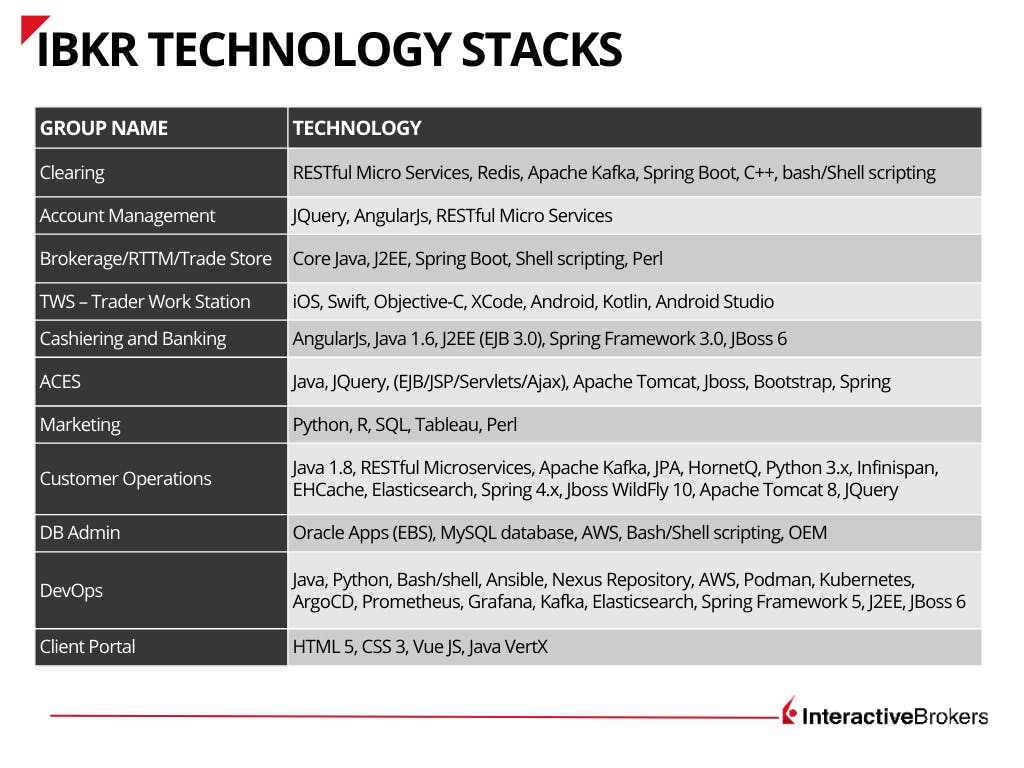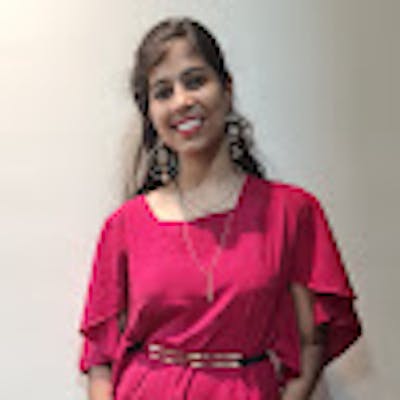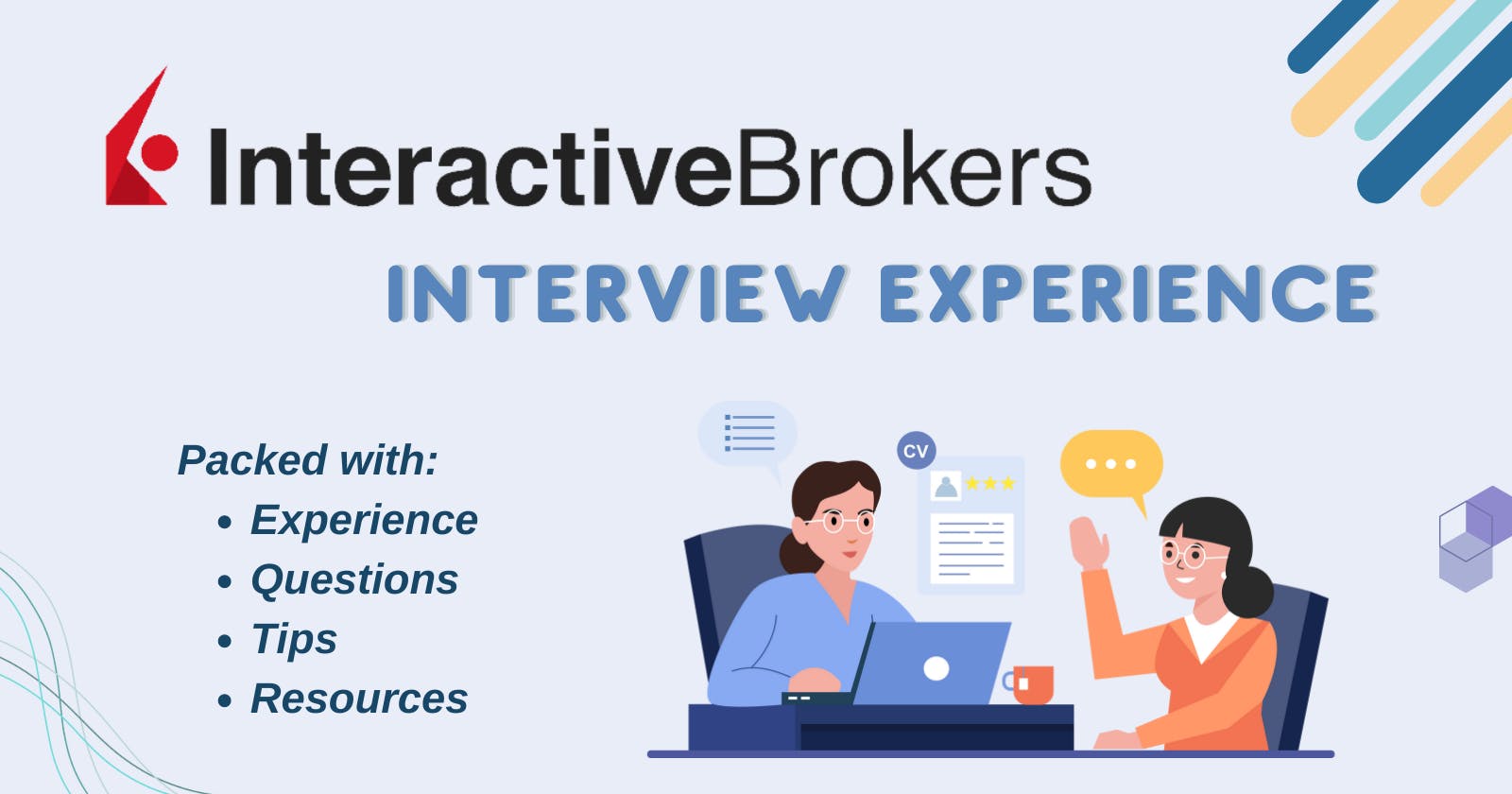Interactive Brokers- Interview Experience
Contains experience, questions, tips, and resources.
About Interactive Brokers
Interactive Brokers LLC is an American multinational brokerage firm. It operates the largest electronic trading platform in the United States by number of daily average revenue trades.
Tech Stack

Eligibility criteria
Branches Eligible are BE (Computer, Information Technology, and Artificial Intelligence and Data Science)
No current backlogs
Aggregate CGPI till current semester above 8.3
Minimum 87% in 12th / Diploma
Minimum 90% in 10th
Placement process
The registration form was released on 18th July and the deadline for the same was 19th July 2023
PPT and test on 24th July 2023
Predictive Index round: 24th July 2023
Interview Rounds: 25th July - 27th July 2023
After filtering based on eligibility criteria, only 56 people were announced eligible for the first round.
Online test
Mode: offline (to be given on college PCs)
Platform: mettl
Duration: 60 minutes
No negative marking
Number of sections: 1
Bifurcation:
5 quantitative aptitude questions
1 coding question
The PPT round was conducted in the auditorium and the test was conducted just after that in the labs. The test was not proctored by Mettl but the placement coordinators present in the labs supervised the process. Even company officials were visiting labs and candidates.
How to prepare for online test:
Preparing for this round is not very difficult. You will be easily able to crack them if you master:
In the end, only 6 candidates were chosen for the second round (Predictive Index).
Predictive Index (PI) round:
The Predictive Index or PI round was held in the evening on the day of the test. The deadline for this round was midnight on the same day.
A Predictive Index is a psychometric evaluation of a person's personality in a work environment, and how compatible the candidate will be with the company's culture.
2 questions are asked and you are given a list of qualities that the candidate has to choose from to respond to the question.
Be formal and professional, choosing qualities that are workplace-related.
All 6 candidates were qualified for this round.
PS: If you get rejected in this round, you will never be able to apply for IBKR.
Technical Interview 1
Both interview rounds were held on the Codility platform.
Questions asked were more or less focused on Java and SQL.
Questions asked to me:
How proficient are you in Java?
Objects and references in Java.
Memory management in Java.
Collection Frameworks and how they work internally.
Difference between LinkedList and ArrayList. Which one is faster?
When inserting and retrieving elements, which one is faster?
Advantages of LinkedList over ArrayList?
Tell me about the 'final' keyword in Java.
Can the 'final' keyword be used in all OOP properties in Java?
Hashmap in Java and how it works. Can duplicate keys exist?
Can there exist a 'null' key in a hashmap in Java?
Follow-up question: explain all OOP concepts.
He then gave me a table and a problem and asked me to write an SQL query for that. The query was of easy level which could be easily solved using aggregate functions.
Then the interviewer asked me some puzzles/aptitude questions. Easily solvable if one has done enough quantitative aptitude.
Then the interviewer asked if I had any questions for him.
How to prepare: Learn Java in-depth because IBKR's tech stack is mostly based on Java.
Only 3 candidates qualified for technical interview 2.
Technical Interview 2
The interview was not completely technical but a mix of technical plus general. My approach to questions was studied and discussed.
It started on a lighter note and the interviewer asked how my day went. Then the questions started.
General questions:
How much do you know about Interactive Brokers? Can you tell me?
Is there anything that is not present on your resume but you'd like to mention?
Are there any seniors working at IBKR that you know of?
Where did you hear the first time about the firm?
Where and how much did you use Python?
How comfortable are you in Java?
Do you use ChatGPT for your work?
Which domain are you most interested in (ML, frontend, full stack)?
The interviewer then gave me some puzzles and asked my thinking to solve the problems. 2 questions were of quantitative aptitude type (profit, loss, and discounts) and 2 were puzzles to assess my cognitive ability.
Java questions:
Is Java completely object-oriented?
What are the data structures in which data is stored in Java?
Explain the mechanism of data storage.
What are Immutable classes in Java?
What is the difference between an Integer and an int?
Write a code to find the middle node in a LinkedList.
Will my code give a Null Pointer Exception at any line? Rectify it.
What is String Pool in Java?
What is abstraction in Java?
Under what condition can method overriding not be done?
Is the use of the 'static' keyword against OOP concepts?
Follow up: why is the static keyword used?
He asked one Operating System question: Difference between Process and Program?
The interviewer was very sweet and supportive, nudging me in the right direction. It is important to always think out loud. Doesn't matter if you think it is wrong, let them know what you are thinking.
This was the last round and only 1 candidate was hired for the role of Junior Software Engineer.
Tips
Highlight any extracurricular activity you've taken part in or anything worth mentioning when asked.
Smile and don't lose your calm when you don't know the answer to a question. Politely say so but assure them that you'll explore the topic.
Be honest. Do not bluff. Interviewers are very experienced and can see past your bluffs.
Ask questions at the end of the interview.
Resources
Resources I followed and that I recommend.
Data Structures in Java: Kunal Khushwaha-DSA
OOP in Java and more: Telusko-Java Tutorial
Basics of SQL: Rishabh Mishra-SQL
Operating System: GateSmashers-OS
Operating System Cheatsheet: OS-Cheatsheet
Computer Network Cheatsheet: CN-Cheatsheet
I created a GitHub repository, adding every concept and DSA program I solved. It contains all the previous year's questions of multiple companies. You can access it here DSA in Java repository.
About me
I'm a final-year Information Technology student. In case of queries, here are my profiles:
GitHub: divisha-gh
LinkedIn: divisha-li
Leetcode: divisha-lc
Resume: resume-IB

